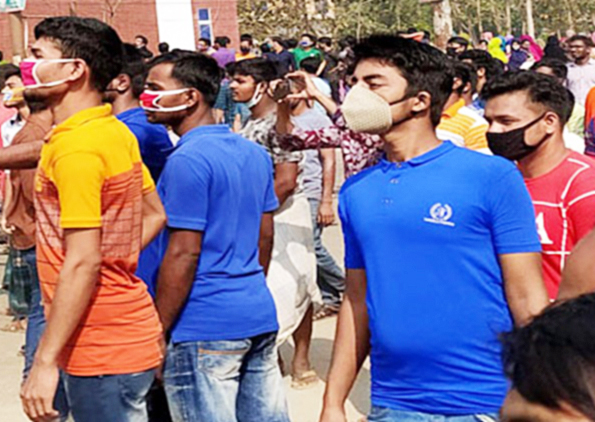Workers in the centers of garment production in Asia and elsewhere are taking heavy blows from decisions taken by the capitalist bosses in Europe and North America to shut down whole sections of their economies, including much of the clothing trade.
As retail giants in the imperialist countries cancel or postpone orders with their suppliers, thousands of factories are threatened with closure and tens of millions of workers and their families risk losing their livelihoods.
“It’s difficult to know how many factories are still running and how many are closed,” Nazma Akter, president of the labor union Sommilito Garments Sramik Federation, told the Militant by phone from Dhaka, Bangladesh, April 7. “They keep going until all their orders are produced. But many, many workers have been sent home.”
According to Rubana Huq, president of the Bangladesh Garment Manufacturers and Exporters Association, orders cancelled so far risk unemployment for 2 million workers.
Citing concerns over the spread of coronavirus, the government instituted a nationwide lockdown March 26 through April 4 and deployed military and police to enforce it. Large gatherings are banned, but garment plants that had outstanding orders were permitted to operate.
“This was a disaster. All public transport was closed down,” Akter said. “Workers at factories that were still running had to spend forever walking to and from work. Workers who had gone back to their villages after companies suspended production had to walk back for the scheduled reopening.”
On April 3, 1,000 workers started a 70-mile march to get back in time, a march that would take them from 18 to 28 hours. “The fear of losing my job is bigger than the fear of coronavirus,” Farzana Akter, one of the marchers, told bdnews24. She works in Dhaka, the capital, but had returned to her home village before the shutdown.
Workers rally to demand wages
Hundreds of workers showed up at the gate outside Crown Wears factory in Bhaluka, north of Dhaka, at 7 a.m. on April 6 to start work. They were met with a notice that the factory would be closed until April 14. It said information about wages owed would come later. It turns out the government had extended the lockdown until at least April 11.
Incensed, workers organized a protest blocking the highway outside the gate, demanding payment of March’s wages. The industrial police raced to the site, charged the workers with batons, and fired rubber bullets and tear gas to disperse them. In the melee that followed two workers who tried to run away got in front of a truck on the highway and were killed.
“There are many, many protests. Not getting their wages is the main worry for workers,” Nazma Akter said. “They are already low paid, have no reserves, and losing their income puts thousands of families in a very difficult position.”
The Sommilito union succeeded in getting an agreement from the bosses that some 8,200 workers at Natural Denims will receive full pay during the factory closure.
“But most workers are not represented by unions,” Akter said. “So they have nothing at all guaranteed. And the guarantees we have are no good if the companies go bankrupt.”
Tens of thousands of garment workers in Bangladesh have engaged in strikes and street protests over the past decade. They have pushed back some of the worst conditions, including winning prohibition of child labor. They have won wage increases, restrictions on the length of the workday and workweek, union inspections of fire and safety standards in the factories, and legal easing of some obstacles to union organizing. Women’s entry into the workforce and participation in leading these struggles has led to changing attitudes towards women in society as a whole.
“If the crisis continues and leads to bankruptcies, we could see millions of unemployed,” Asad Sattar, director of Utah Group, a knits and wovens manufacturer, told the online Sourcing Journal March 25. “There is growing fear that this may in turn lead to unrest.”
In their pursuit of profits on the backs of cheap labor, retail giants like Walmart, Zara, Gap, Levi’s and H&M have outsourced production to capitalist bosses in a number of Asian countries over recent decades. In 1977 there were eight garment factories in Bangladesh. Today there are some 5,000, employing 4 million workers. The vast majority of them are young women, who have moved into burgeoning cities from a life in rural villages.
This industrial revolution has been marked by brutal conditions with low wages, long hours at work and dangerous, often deadly, working conditions with frequent fires and factory building collapses. At the same time, the new forces brought into production have strengthened the working class in Bangladesh and the world, and produced new gravediggers of capitalism.
The garment industry accounts for 80 percent of the bosses’ exports from Bangladesh.


